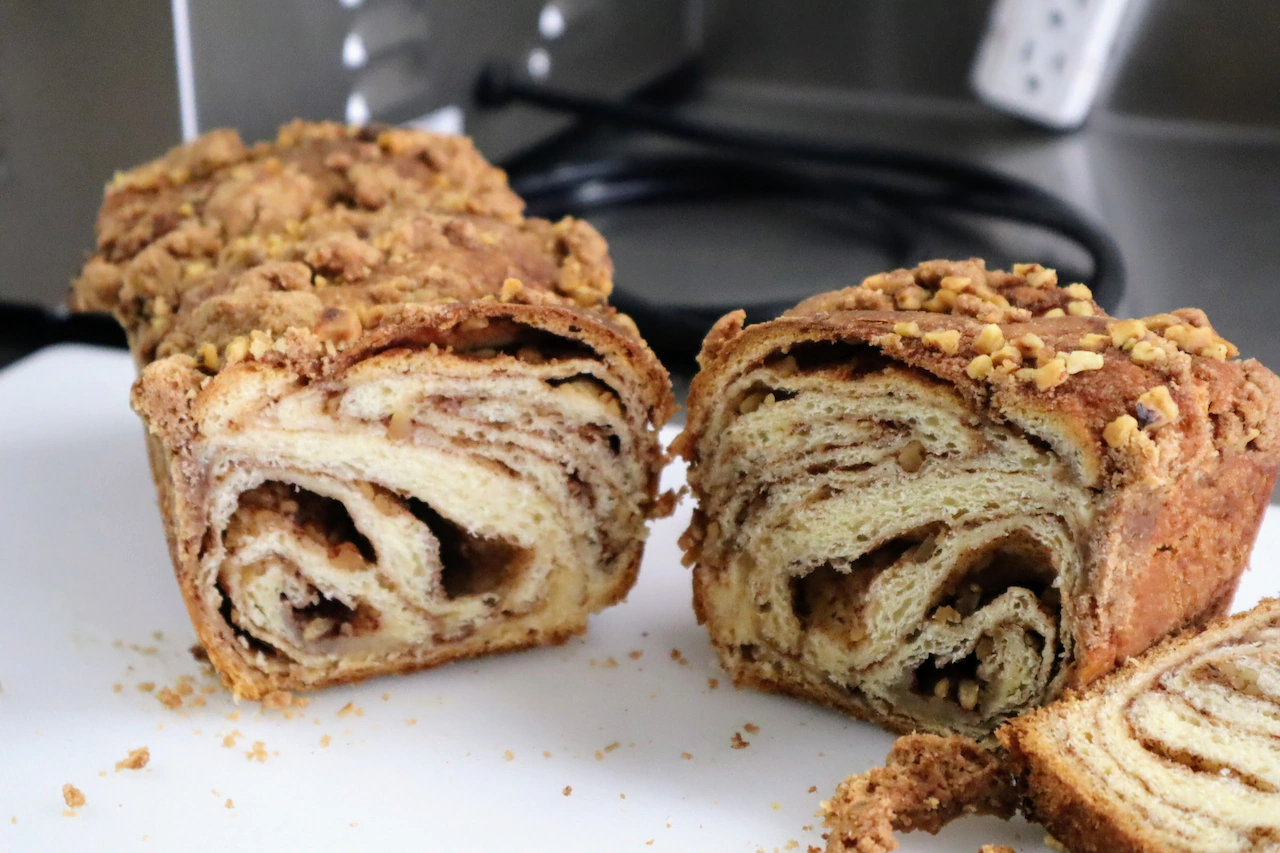
Zicra Lukin didn’t grow up eating much babka. But on the verge of opening her own Jewish bakery, Babkush just off Southeast Hawthorne, she’s found herself surrounded by the sweet braided bread, often filled with chocolate, fruit or cinnamon.
“It was never anything that was part of a great family tradition, or something that I longed for,” Lukin said. “The babka that I remember from my childhood was pretty dry and unremarkable.”
While seeking a pandemic hobby with her daughter, Lukin was reintroduced to babka. Instead of pulling from her Jewish family recipes, she developed her own recipes drawing mainly from her personal tasting and eating experiences.
Lukin hopes to open her Babkush storefront in November. Since leasing a commercial kitchen from cloudforest in April, she’s been accepting orders online and participating in farmers markets. Babkush is just one small piece of what Lukin calls the “babka renaissance.”
“People were really excited about it in New York,” Lukin said. “A lot of it has to do with this guy, Uri Scheft, who owned Breads Bakery, and he kind of reintroduced babka… to me, it felt like a new, updated version.”
Modern babka has incorporated new and inventive flavors, fillings and ingredients, like Lukin’s seasonal cinnamon walnut babka or apple, date and cardamom babka for Yom Kippur. But her specialty is chocolate babka.
Babka originated in the Jewish communities of Eastern Europe, often made with a rich, braided, yeast-leavened sweet bread filled with cinnamon, jam, raisins or chocolate. The term “babka” means grandmother in Polish and Yiddish.
Babka is definitely the anchor product at Babkush, Lukin said, but the bakery also offers chocolate rugelach, little chocolate crescent rolls soaked in a honey simple syrup, and amaretti cookies, traditional Italian almond-flavored cookies. Current flavors include chocolate hazelnut, vanilla matcha and halva date. Lukin also rotates through seasonal flavored babkas and holiday treats.
“For Hanukkah, I make sufganiyot,” Lukin said. “At Purim, which is a holiday in the spring, I make hamantaschen. But I’m also trying to bring in different cultures: I make an Iraqi Jewish pastry called baba ta’mar, which is like a yeasted dough stuffed with a date paste.”
For Lukin, weaving in Jewish baking traditions from across the world is central to sharing culture and expanding the picture of what Jewish baking can be.
“It got me thinking about the way Jewish food is represented in the U.S., and what Jewish food we see,” Lukin said about the beginning of her baking journey. “And it sort of inspired me to start thinking about bringing in other Jewish baking traditions from different communities, different parts of the world.”
Through farmers markets, Lukin has been able to give many people their first tastes of babka or other Jewish baked goods.
“It’s been really, really positive,” Lukin said about her customers’ feedback. “The two groups are babka connoisseurs to the babka novices.”
She hopes to appeal to both groups in her retail space while also fostering a gathering space for the Jewish community. That sense of community extends beyond the bakery’s walls through her background in political advocacy.
Her experiences as an advocate for gun violence prevention and social justice have shaped how she envisions the role of her bakery. Lukin has centered her personal values into Babkush, donating a portion of sales to mutual aid groups directly supporting families in Gaza. The decision, she said, is rooted in her belief that speaking out against injustice should be second nature.
“Palestinian solidarity is really important to me,” she said. “It feels really important for me, in a moment when I have an opportunity as a Jewish bakery, to stand up and say the things that need to be said.”
Already, Babkush’s social media presence strongly emphasizes social justice issues, sharing resources to educate the general public, contact legislators and support Palestinian-serving organizations. Encouraged by her community’s response, Lukin plans to continue that focus when her business opens.
“I feel like, if I have a platform, I really want to ask folks to look into other ways to participate in Palestinian solidarity in Portland,” Lukin said.
Until Babkush bakery officially opens to the public, customers can order baked goods by directly messaging the Babkush Instagram account or placing an order through the form linked in the account’s bio.
You can also find Babkush at the Beaverton Farmers Market on Saturdays through the end of October, the Hillsdale Farmers Market on Sundays through the end of October and the King Farmers Market on Oct. 12, 26 and Nov. 9. Babkush Babkas are also available for purchase at Providore Fine Foods on Northeast Sandy Boulevard and Bread and Roses Market on Southeast Foster Road.
Faith and cultural connections
This Wood Village bakery offers a warehouse-sized selection of Mexican pastries
York Fest honors the legacy of the only Black member of the Lewis and Clark Expedition
Learn how to make mooncakes at this Portland anime cafe
Why does TikTok think the Rapture is happening? Local experts explain
El Grito de Portland continúa hoy con un espíritu de resistencia alegre